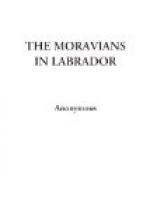FOOTNOTES:
[Footnote H: The Esquimaux always receive a new name at baptism, and most of them have such an abhorrence at the recollection of their early life as heathens, that it sickens them when any one calls them by their old Esquimaux names. They regard the days past, in which they fulfilled the lusts of the flesh, as almost literally a state of death.]
CHAPTER VI.
Mutual affection of the Christian Esquimaux
and
Greenlanders—their correspondence—letter
from Timothy, a
baptized Greenlander.—Delight
of the Esquimaux in religious
exercises.—Order of the
congregations—distressing events,
apostasy of Kapik—awful
end of Jacob—peaceful death of
believers—Judith, Joanna.—Revival
among the communicants.—A
feast by a Christian brother, to
the Esquimaux.—Winter
arrangements.—Childrens’
meetings—schools.—The brethren’s
settlements contrasted with the
heathen.—Progress of religion
at the different stations.—Books
printed in the Esquimaux
language.—Number of the
settled Esquimaux.—Epidemic at
Nain—its consequences.—General
view of the mission.
Love to all the members of the body of Christ, is the visible token of the vitality and truth of a Christian profession; and as it rises or falls, the progress of an individual or a community waxes or wanes. At this period, the converted Esquimaux felt a lively interest, not only in their countrymen, but likewise in their fellow-Christians in Greenland; the affection was reciprocal, and though they had never seen each other in the flesh, they rejoiced over each other’s welfare, and communicated their feelings in affectionate letters. Jonathan had dictated an epistle to the baptized Greenlanders, in 1799; the annexed was from the Christian Greenlander, Timothy, an assistant at Lichtenfels, in return. “My beloved, ye who live just opposite us, on the other side of the great water!—You have the same mode of living that we have; you go out in your kaiaks as we do; you have the same method of procuring your




